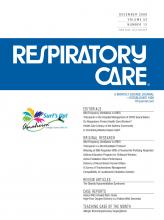Abstract
BACKGROUND: Tiotropium is used in maintenance treatment of chronic obstructive pulmonary disease (COPD), but there are no guidelines on when to start tiotropium following an exacerbation.
OBJECTIVE: To determine whether the addition of tiotropium to a respiratory-therapist-directed bronchodilator protocol affects bronchodilator costs for patients hospitalized for COPD exacerbation.
METHODS: We retrospectively analyzed data on the number and type of bronchodilator treatments administered to all patients admitted for COPD exacerbation during the 3-month period (January through March 2006) after tiotropium was added to our bronchodilator protocol, and compared that data to a historical control period (January through March 2004) before tiotropium was available in our hospital. We compared the costs of bronchodilator treatments, baseline patient characteristics, comorbidities, concomitant medications, length of stay, adverse events, and in-hospital deaths.
RESULTS: Baseline characteristics, comorbidities, and concomitant medications were similar in the 2004 control group (n = 181) and the 2006 intervention group (n = 174). The mean SD number of bronchodilator treatments per admission was significantly higher in the control period (13.6 ± 15.6) than in the intervention period (10.6 ± 9.4). That difference correlated to a reduction in combination therapy (short-acting inhaled β2 agonist plus ipratropium), which decreased from a per-admission average of 6.7 ± 14.2 in the control period to 1.9 ± 5.1 in the intervention period. Calculated bronchodilator costs were significantly lower in the intervention period than in the control period. Length of stay also significantly decreased, from 6.5 ± 5.0 d to 5.5 ± 4.0 d. There were no adverse events related to tiotropium. Pulmonary-related in-hospital deaths were not significantly different between the 2 periods.
CONCLUSIONS: Early addition of maintenance-treatment tiotropium to a respiratory-therapist-directed bronchodilator protocol for patients hospitalized for COPD exacerbation reduced costs and produced no safety concerns.
- tiotropium bromide
- chronic obstructive pulmonary disease
- COPD exacerbation
- respiratory therapist-directed bronchodilator protocol
- COSTS
- β2 AGONIST
- long-acting inhaled bronchodilator
- anticholinergic
Footnotes
- Correspondence: Gail S Drescher MA RRT, Pulmonary Services Department, Washington Hospital Center, 110 Irving Street NW, Washington DC 20010;, Email: Gail.S.Drescher{at}medstar.net.
Gene L Colice MD has had relationships with GlaxoSmithKline, Boehringer Ingelheim, Pfizer, Eli Lilly, Abbott, Genentech, Almirall, Forrest, Adams, TEVA, OM Pharma, Nomura, and MedImmune. The authors report no other conflicts of interest related to the content of this paper.
- Copyright © 2008 by Daedalus Enterprises Inc.







